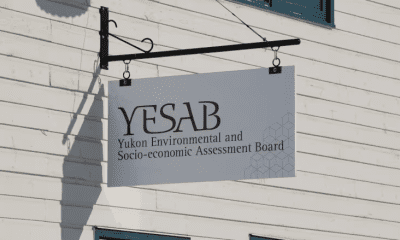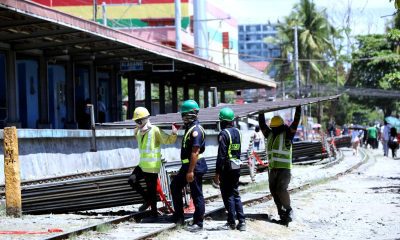News
Cambodia paper is latest victim of intensifying crackdown

Edition of The Cambodia Daily with its Khmer section. (Photo By Albeiro Rodas – Own work, CC BY-SA 3.0)
PHNOM PENH, Cambodia — When Cambodia’s main opposition leader was arrested over the weekend in a surprise police raid, one of this country’s last independent media outlets rushed reporters out in the middle of night to cover the story, just as it has done for nearly a quarter-century.
But the English-language Cambodia’s Daily’s reportage about the arrest of Kem Sokha, who stands accused by the government of treason, was a tragic story in and of itself: it was to be the paper’s last.
On Monday the venerable broadsheet, which has helped pioneer press freedom and train generations journalists in Cambodia since it was founded in 1993, appeared in newsstands here for the last time — the latest victim of a determined push by the government of Prime Minister Hun Sen to silence critics in the run-up to 2018 elections.
The paper’s owners said they were forced to close because of “extra-legal threats by the government,” a reference to a $6 million tax bill they say authorities contrived with no audit and a single purpose — to shut them down.
“It’s terrible, it’s frustrating,” said Chhorn Chansy, who worked for a decade at the paper as a reporter and news editor. “We normally write about others. We can’t believe that this happened to us.”
During its 24-year-run, the Cambodia Daily served as rare model for budding journalists, offering a window into a growing nation that is still emerging from decades of conflict and genocide. About half the Daily’s 30 editorial staff were Cambodian; the other half were foreigners drawn here from around the world.
The paper, which included a Khmer-language section, acquired a reputation for hard-hitting investigations in a nation where such things were rare. It was also a consistent thorn in Hun Sen’s side. Its final front-page headline, “Descent into Outright Dictatorship,” ran above a story about Kem Sokha’s arrest. Below the piece was another that announcing Monday’s edition would be its last.
Jodie DeJonge, the paper’s American chief editor, called the closure a “blow against press freedom, a blow against allowing dissenting voices to be heard, a blow against democracy in Cambodia.”
“It’s hard to imagine that after working for so hard for so long, these journalists just have to walk away,” she said.
The Daily’s fate is part of a much broader government crackdown on critics that has intensified dramatically in recent weeks and left many wondering where the nation is headed. It’s also part of a major shift away from American influence, which has waned for years as Cambodia edges closer to China.
Last month, authorities expelled the Washington-based National Democratic Institute and ordered at least a dozen radio stations shut down for allegedly violating broadcasting agreements. Although Ouk Kimseng, an information ministry spokesman, said the government was simply enforcing the law, the stations appear to have been singled out because they were they gave air-time to opposition politicians and the U.S. government-funded Voice of America and Radio Free Asia, which have also been accused by authorities for failing to pay taxes.
The stations were among only a few in the country considered independent. Their closure will have a profound impact on the ability of rural populations — which comprise a majority of the country — to obtain contrarian views. “How will the Cambodian people be able to evaluate or access real information?” asked Yi Chhorvorn, managing director Mohanokor Radio, which was among those shuttered with little explanation.
Mu Sochua, a senior member of the opposition party, said the fate of the free press and the arrest of Kem Sokha are part of a government strategy aimed at clearing the stage for Hun Sen ahead of elections next year.
“They think that any voice that is critical has to be eliminated — the media, independent analysts, human rights groups, trade unions, the opposition.”
But free speech, she said, is critical for Cambodia to grow. “This is not about winning or not winning. It’s about giving democracy a chance.”
Although Cambodia is nominally a democratic state, its institutions remain fragile and the rule of law weak. Hun Sen, one of the world’s longest-serving rulers, has been in office since 1985 and has held tightly onto it since. Contentious elections in recent years, however, have seen an emboldened opposition slowly chip away at his party’s strength.
When the Daily was founded in 24 years ago by Bernard Krishner, a veteran American journalist now living in Tokyo, Cambodia’s government, emerging from the chaos of years of war, was barely functioning.
DeJonge, who also worked for The Associated Press for more than 20 years, acknowledged the paper had not paid taxes for most of its existence, but it operated openly for years under the patronage of the late King Norodom Sihanouk, who stepped down from the throne in 2004. It has also run at a loss since at least 2008, so there were never going to be many taxes to pay.
It is unclear how the government’s tax bill was calculated. Authorities never conducted an audit of the paper’s books and never allowed an appeal.
When Krishner’s daughter, Deborah Krishner-Steele, registered the paper properly in April and began paying taxes for the first time, it may have given the government the opening it was looking for.
Referencing the Cambodia Daily’s astronomical tax bill last month, Hun Sen referred to the paper as a “thief” and warned that if it doesn’t pay up, it must shut down. DeJonge said the paper’s targeting clearly indicated political motives; as many as 90 per cent of Cambodian businesses are not tax-compliant, she said.
“It’s crushing that tomorrow we are not going not going to wake up and keep working,” DeJonge said as dozens of reporters wearing blue-and-white T-shirts emblazoned with the words “Save Press Freedom” worked into the night Sunday on the paper’s final edition.
A few had tears in their eyes.
“Cambodia’s democracy is dying in the darkness. Who is going to shine a light on that now?” DeJonge said. “We just don’t know.”
Part of that task will be left to the English-language Phnom Penh Post, which on Monday was already calling itself “Cambodia’s only international award-winning newspaper.”





















